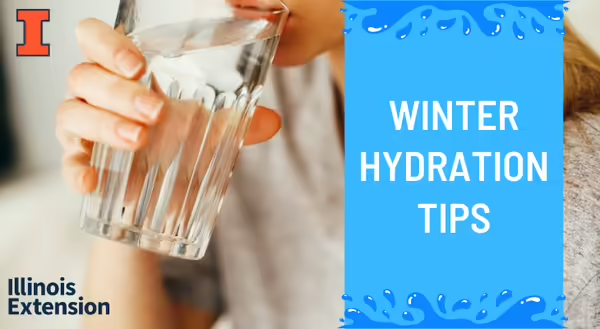
Keeping our bodies hydrated is important for our overall health and wellness. Dehydration can lead to both physical problems (headache, fatigue, weakness, loss of appetite) and mental/emotional problems (confusion or delirium, irritation, and anxiety). It can be scary, dangerous, and it won’t always be signaled by thirst—especially in the winter.
Water Loss in Winter Months
During Midwest winters, cold, dry air moves in from the Rocky Mountains or Canada. The dry air contributes to fluid loss and the cold air can cause fluid shifts to keep you warm. You may not feel it, but we lose some water from our bodies every time we breathe. With all the heavy winter clothing, we also sweat more as we work to move around, making us lose even more water. To make matters worse, we may not even notice it’s happening! Our body shifts our blood towards our core in the winter to conserve heat. This tricks our brain into thinking our blood volume is good, even if it is too low because of water loss (dehydration). As a result, our thirst signaling does not kick in. Don’t be fooled by the cold weather; take preventative action.
Staying Hydrated
The key to staying hydrated in the winter is mindfulness. Don’t wait for your body to crave fluids. Instead, pay attention to your fluid intake and be sure to drink plenty of water throughout the day. Aim to drink at least 64 fluid ounces of water per day for women, or 96 fluid ounces for men (that’s 8 and 12 cups, respectively). It might be helpful to carry a refillable water bottle with you. This will not only help to keep track of your progress, but it can remind you to sip on it throughout the day.
Rehydrating: Replacing Fluids and Electrolytes
Ideally, the goal is to avoid dehydration by staying properly hydrated, as outlined above. However, if the symptoms of dehydration hit you, it can be wise to reach for an electrolyte drink to rehydrate quickly.
Our body constantly maintains a balance of electrolytes (sugars and salts) in its fluids. An imbalance in our electrolytes is, in part, why dehydration can have so many physical and mental/emotional side effects. When people start showing these warning signs of dehydration, a properly balanced electrolyte drink is important for quick rehydration. This is because:
- Our gut absorbs more liquid when it is mixed with the electrolytes our bodies need in the correct amounts.
- If we replenish our water without replacing the electrolytes we have lost, we risk diluting the electrolytes in our bodies too much. This can lead to other dangerous conditions, the most extreme of which is known as water intoxication.
Many popular sports drinks are not formulated to match our body’s precise needs. The best options for rehydration include:
- Pre-made oral rehydration solutions or drink mixes (mixed according to directions), such as Pedialyte, Drip-Drop, or a similar store-brand formulation. These are usually found in the infant or pharmacy section of the grocery store.
- Homemade recipes with an appropriate proportion of water to sugar, sodium, and potassium. For example: 1 cup orange juice + 4.5 cups water + ¾ tsp salt + 8 tsp sugar (see Dartmouth-Hitchcock website for more recipes).
Most importantly, know when it is time to see a doctor. If someone is at risk of or is showing signs of severe dehydration (has vomiting/diarrhea lasting more than 24 hours, has erratic or delirious behavior), consult a health care provider. If necessary, they can provide IV fluids to rehydrate the person quickly and safely while monitoring their condition and recovery.
The Take-Away
Our bodies need an appropriate amount of water each day to work right. It can be especially difficult in winter to recognize when you’re not drinking enough water. Be mindful of your fluid intake, and make an effort to drink enough water and avoid dehydration in cold weather.
Source: This post was written by Flora Denton, dietetic intern at University of Illinois in Urbana-Champaign, working with Kristin Bogdonas, nutrition and wellness educator, serving Henry, Mercer, Rock Island, and Stark Counties.
Reference in this publication to any specific product or brand name is for educational and informational purposes only and does not constitute an endorsement, or recommendation, of any kind by University of Illinois Extension.
Sources:
American Heart Association News. 2019. “Are You Drinking Enough Water during Winter Months?” American Heart Association (online). https://www.heart.org/en/news/2019/12/19/are-you-drinking-enough-water-during-winter-months.
Cleveland Clinic. 2021. “Dehydration.” Health Library: Treatments & Procedures (online). https://my.clevelandclinic.org/health/treatments/9013-dehydration.
Dartmouth-Hitchcock. 2022. “Oral Rehydration Solution Recipes.” Comprehensive Wound Healing Center: Ostomy Care (online). https://www.dartmouth-hitchcock.org/comprehensive-wound-healing/oral-rehydration-solution-recipes.
Keeler, Sharon. 2005. Cold Weather Increases Risk Of Dehydration.
Lewis, James L. III. 2021. “Overview of Electrolytes.” Merck Manual: Consumer Version (online). https://www.merckmanuals.com/home/hormonal-and-metabolic-disorders/electrolyte-balance/overview-of-electrolytes.
Mayo Clinic. 2021. “Dehydration.” Patient Care & Health Information: Diseases & Conditions (online). https://www.mayoclinic.org/diseases-conditions/dehydration/symptoms-causes/syc-20354086.